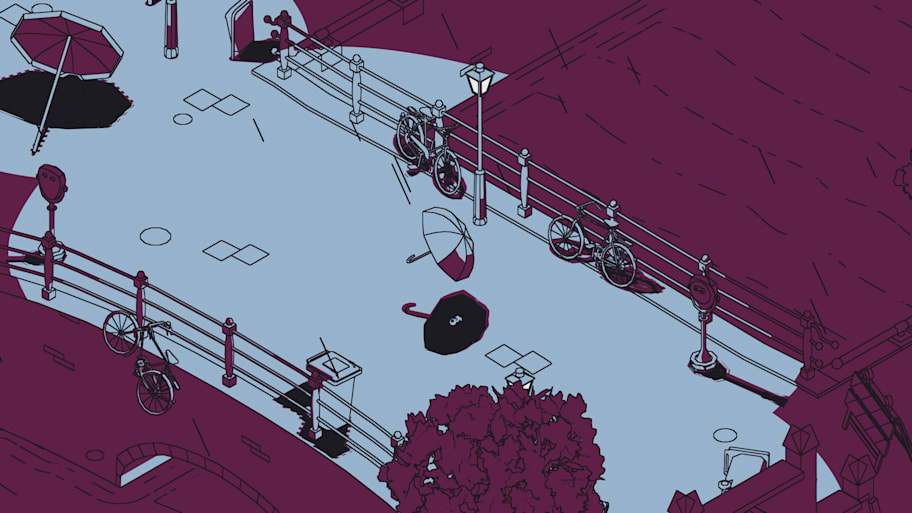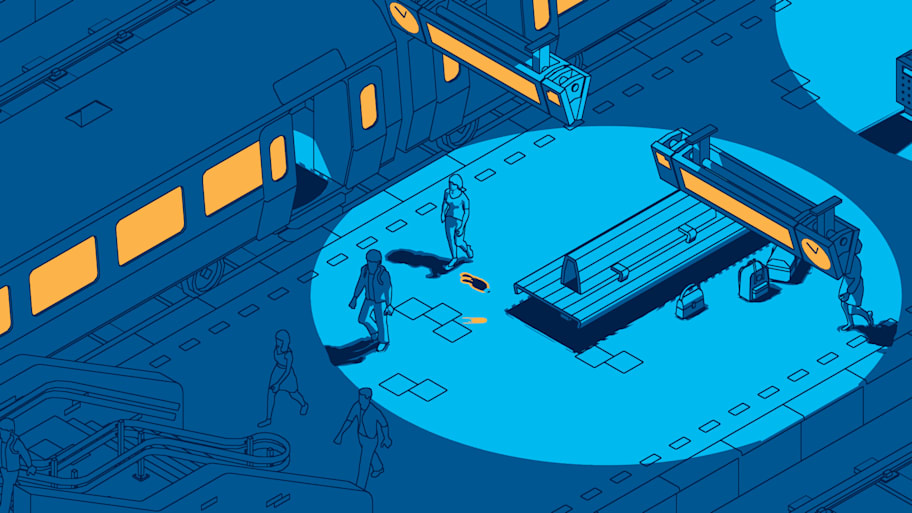Sometimes a glimpse at the high concept is enough to sell you on a game, and Schim is one where the visuals do most of the talking. It’s almost a cliche to call an indie game charming, but that is the main word that comes to mind for the simple yet beautiful visual style. The world is designed with a limited palette to make the game's focus, the shadows, pop out of the scene. Shadows are a part of everyday life and yet you never really notice them – this art style switches your perspective, by letting everything else fade into the background.
The gameplay is equally simple. Your little shadow creature gets separated from its human after a particularly bad day and has to spend the rest of the game hopping across the world trying to reunite with them. As a shadow, you can only travel through the shadows of every person or object in the world, making the game a puzzle platformer.

The problem is that Schim doesn’t have much in the way of puzzles. Working out a route across the game’s relatively small levels is rarely challenging, nor is the execution of that route, meaning there’s no real mental stimulation in the gameplay. I found myself fairly mindlessly hopping from shadow to shadow as the levels rolled on and on for a few hours, with little hint of the game using the concept for something greater.
Occasionally an idea like that shines through. In one of the later levels, you need to hop down a long street where no shadows are in sight. To overcome this you enter the shadow of a parking lot ticket booth and break it, causing a pile-up of traffic so you can use the car’s shadows to get to your goal.
That’s a fun little puzzle that relies on the unique interactions with objects in the world, but it’s also pretty much the only time the game does something like that. You’ll be thrown a few platforming challenges like bouncing off a washing line or catapulting yourself with a street sign, but for the most part, the gameplay is as straightforward as you can get. It means the game wears out its welcome really fast, and after just one hour of this three-hour game I was starting to get bored, a feeling that never went away.

That said, I did still feel enough of a drive to finish it, and there are a few good reasons why. For one, it isn’t that long. While three hours is arguably too long for such simple gameplay, it’s short enough that I was able to see it through without totally losing my patience. On top of that, while the game’s story is fairly basic, it’s compelling enough that I wanted to see how it ended.
After a brief montage of this person’s childhood at the start, you see them get a comfortable office job that they quickly get fired from. From there they go on a journey of self-discovery, traveling around aimlessly for a bit before visiting their hometown, and eventually trying out a bunch of different jobs. Given how limited the game’s animations are, and the complete lack of dialogue, it’s impressive that this story was told so clearly, and it was a small but effective motivation for me to see the game through to the finish line.
For a game I was so quickly sold on by its trailers, I came away disappointed by Schim. It very rarely showed glimpses of the great game it could’ve been, but never committed to that level of fun puzzling gameplay. Instead, I was left bored as I hopped around the shadows. While the story and overall aesthetic are fun at first, they can’t carry the entire experience when the gameplay has very little of substance to offer.
Score: 6/10
Version tested: PC (Steam)
More must-reads:
- Tottenham Hotspur star announces unexpected departure
- Lincoln Riley calls out NCAA amid lawsuit filed by USC player
- The '250-strikeout MLB seasons' quiz
Breaking News
Trending News
Customize Your Newsletter
 +
+
Get the latest news and rumors, customized to your favorite sports and teams. Emailed daily. Always free!








